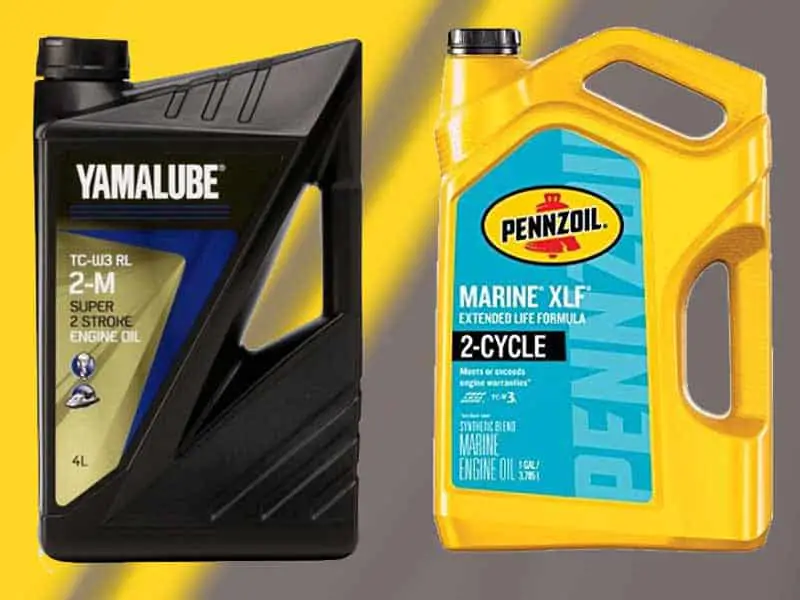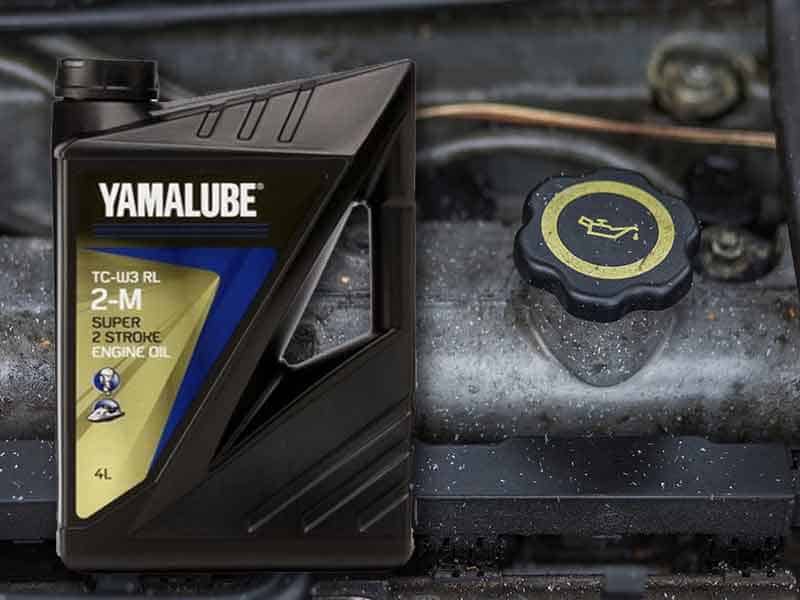In case your boat has an outboard 2-stroke engine, you may want to consider buying either the Pennzoil Marine XLF or Yamalube RL 2-M Super engine oil as they are one of the best-selling 2-cycle marine engine oils in the market.
The Pennzoil Marine XFL engine oil is best suited for use in older steel boat engines and sports boat engines. It is recommended to be used in outboard boat engines manufactured by Evinrude, Johnson, Mercury, Mariner, US Marine, Yamaha, Suzuki, and Sears.

Pennzoil Marine engine oil can prove to be the best choice for engines that are seasoned. In simpler words, engines that have been in use for a long time and are in a rough condition can benefit from the Pennzoil Marine Engine oil because it has advanced anti-wear additive formulation and can restore the efficiency of roughened up engines.
On the other hand, the Yamalube RL 2-M Super is recommended for modern low-emission boat engines. It is recommended to be only used in outboard engines manufactured by Yamaha itself.
It is manufactured using exceptional detergent formulations and is perfect for maintaining cleanliness in engines because of its extraordinary rust and corrosion defense mechanism.
Its cleaning properties can prevent issues like pre-ignition or engine contamination which are quite common problems in modern engines.
The Pennzoil Marine XLF TC-W3 is a 2-cycle synthetic blend engine oil made for boats with outboard engines. It is formulated with ashless dispersants to keep your engine exhaust clean and emit minimal smoke. Its anti-gel formula helps against gel formation in the engine so it can work effortlessly without freezing in cold temperatures.
The Yamalube RL 2-M Super is also a 2-cycle outboard marine engine oil.
Due to the advanced additives present, it can withstand severe conditions like extreme heat and pressure easily while providing wear protection to the engine. It also helps in maintaining minimal smoke emission from the exhaust.

Table of Contents
Quick Comparison
| Specs | Pennzoil Marine XLF | Yamalube® TC-W3 RL 2-M Super |
| Oil Type | Synthetic Blend | Synthetic Blend |
| Engine Type | Outboard | Outboard |
| NMMA Certification | TC-W3 | TC-W3 |
| Price | 17$ for 1 Gallon | 48$ for 1 Gallon |
| Oil Change Frequency | 50 to 100 hours of driving | 50 to 100 hours of driving |
| Additives Used | Ashless anti-knock additives, Dispersants, Detergents, Anti-wear, Anti-oxidants, Anti-gel Additives. | Dispersants, Detergents, Anti-wear, Anti-oxidants. |
What does TC-W3 mean?
You may be wondering what does the TC-W3 means as it’s included in the name of both engine oils. It means that the engine oil has been certified by the National Marine Manufacturers Association. The TC stands for Two-cycle meaning it is a two-stroke engine oil. The W indicates that the oil is best suited for water-cooled engines. The number 3 indicates that it is third-generation engine oil.
Pennzoil Marine XLF and Yamalube TC-W3 RL 2-M Super Comparison
Comparing Oil Type
The Pennzoil marine is a synthetic blend or half synthetic engine oil. It has extra lubrication to operate in extremely cold temperatures.
Usually in cold temperatures, the viscosity of other synthetic blend marine engine oils increases i.e., they become thick, however, Pennzoil uses an anti-gel formula to prevent that and keep the oil’s viscosity thin at low temperatures so it easily flows and piston scuffing doesn’t occur.
The Yamalube RL 2-M Super engine oil is also synthetic blend in nature. Opposite to the Pennzoil engine oil, Yamalube 2-M is made to withstand extremely hot temperatures.
Due to its separation lubrication formula, it helps reduce baked piston rings and pre-ignitions in engines.
Comparing Additives
The Pennzoil Marine XLF uses an ashless anti-knock additive. It balances the fuel and air mixture in perfect proportion so your engine doesn’t knock. It has dispersants and detergent additives present for cleaning purposes.
An anti-gel additive is used in the Pennzoil engine oil, it helps to keep oil viscosity thin at cold temperatures. Anti-wear additive protects the engine from wearing off.
Yamalube RL 2-M has an anti-oxidant additive present to protect from oxidation in the engine. Its detergent additives provide exceptional protection from rust and corrosion hence reducing sludge-build up in the engine. The anti-wear additive promises long-term engine life by providing excellent protection.
Effect On Engine Performance
Engine Wear-Off Protection
The Pennzoil Marine has an advanced anti-wear additive formula in which it uses a thin layer of zinc and phosphorous to protect the engine from the high-pressure points by absorbing the impact.
Moreover, it also has titanium nanoparticles present in it that reduce the friction rate between the pistons hence reducing the wear rate of the engine.
Yamalube RL also uses zinc additives to reduce engine wear but in addition to that, it also has a high amount of Molybdenum which provides great defense against oxidation in the engine. It is known to provide wear protection against piston eaters.
Engine Seals Protection
After running in water for a long time, carbon deposits can settle on the pistons and combustion chamber of the boat’s engine. This formation of carbon deposits on pistons and the combustion chamber can ultimately damage the seals of the engine.
The Pennzoil Marine due to its specialized detergent formula does not allow the carbon deposits to settle within the engine thus protecting its seals in the long run.
Yamalube RL provides conditioning lubrication in it. It can help prevent seals from cracking by the water pressure and along with that help reseal any cracks already present in the engine seals.
Reduction Of Sludge Build-Up
Compared to a road vehicle’s engine, a boat’s engine has much more chemically toxic sludge build-up due to the toxicity of the water.
Thus, the Pennzoil Marine uses a combination of calcium and magnesium in balanced proportions as detergent additives to clean engine sludge.
But that’s not enough for the toxic sludge, so it has ashless dispersant additive technology that completely dissipates the sludge and as the word “ashless” suggests, leaves no soot behind.
Yamalube RL engine oil has a large amount of calcium present in it with a little trace of magnesium. It can still effectively clean the engine from sludge thus offering low aquatic toxicity.
However, high amounts of calcium as a detergent additive can result in soot buildup in the engine after sludge cleansing.
Oil Change Frequency
Pennzoil Marine engine oil provides an oil change interval of up to 50 to 100 hours of driving in the water, you can extend it to 150 hours but the boat will be at risk of oil breakdown.
Yamalube RL also provides the same oil change frequency as Pennzoil Marine i.e., 50 to 100 hours.
Hence both the engine oils are quite decent at providing long oil change intervals.
Fuel Economy
Fuel economy of the boat is directly related to sludge build-up in its engine. The less the sludge build-up is, the higher will be the efficiency of the engine hence resulting in longer oil change intervals.
Pennzoil Marine has impressive sludge cleaning capabilities thanks to the additive technology used in it hence it provides an increased fuel economy
The Yamalube RL does not disappoint as it has quite decent protection against sludge build-up as well. It reduces sludge in between pistons and outlet openings hence increasing the efficiency of the pistons resulting in increased engine efficiency.
And when the engine is working efficiently, the fuel economy increases.
Oil burn-off Protection
Oil burn-offs can occur in extreme temperatures. The Pennzoil Marine engine oil protects against that in colder temperatures by not letting the oil viscosity become thick using its anti-gel formula. Thin oil flows effortlessly between the pistons and oil burn-offs don’t occur.
Yamalube RL can protect oil burn-offs at extremely hot temperatures by maintaining the lubrication between the pistons and keep them running smoothly. Less friction between the pistons will help prevent oil burn-offs.
Viscosity Of Both Marine Oils
The Pennzoil Marine engine oil has a viscosity of 59 at 40 degrees Celsius and 9.37 at 100 degrees Celsius. Its viscosity index is 133.
The viscosity of Yamalube RL is 11.76 at 100 degrees Celsius at its SUS viscosity is 65.5 at 98 degrees Celsius.
Cost Comparison
The Prices of both engine oils are listed below:
- The Pennzoil Marine XFL costs 17$ for a One Gallon Bottle.
- The Yamalube RL 2-M Super costs 48$ for a One Gallon Bottle.
Conclusion
The Pennzoil Marine engine oil provides excellent anti-wear protection and can restore the efficiency of old and roughened-up engines. It also provides better reduction of sludge build-up compared to Yamalube as it specializes in removing toxic aquatic sludge due to its ashless dispersant technology.
It is recommended for use in steel boat engines and sport’s boats.
The Yamalube RL proves to be a good marine engine oil to protect against pre-ignition and spark plug fouling in modern engines. It is used because it provides better protection to the engine seals in modern engines.
The Pennzoil Marine is the better choice as it can be used in a variety of engines while the Yamalube RL is only suited for Yamaha manufactured engines. The Pennzoil Marine is also significantly cheaper than the Yamalube while being a better marine engine oil.